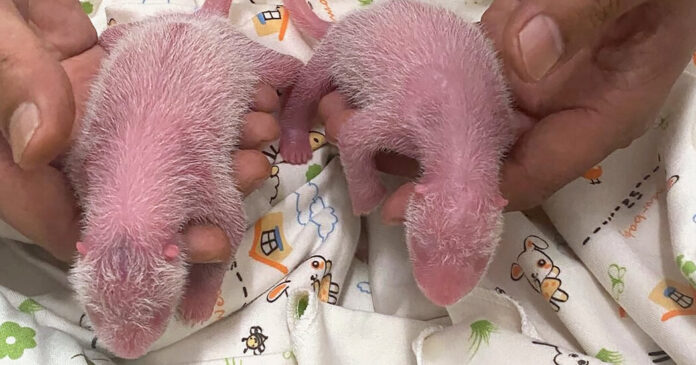Ying Ying, a panda at a Hong Kong theme park, has given birth to twins that were conceived naturally, a cause for celebration for conservationists rooting for the survival of this vulnerable and low-libido species.
Ying Ying delivered the cubs one day before turning 19, making her the oldest giant panda on record to give birth for the first time, according to Ocean Park, the animal theme park where she lives. The cubs are also the first to be born in the city.
Paulo Pong, the chairman of Ocean Park Corporation, said that the births were “thrilling news” and a rarity, given Ying Ying’s advanced age. (Pandas in captivity can live to around 30, but 14 to 20 is more typical in the wild.)
Ying Ying and Le Le, her mate at Ocean Park, had earlier drawn attention when they mated naturally in 2020 for the first time after 13 years of trying in captivity. At the time, the amusement park and zoo was closed to visitors because of the coronavirus pandemic. In the months that followed, Ying Ying was sluggish, and her appetite was diminished, raising hopes that she could have been pregnant, but the park later said she was not expecting after all.
This time, the park kept quiet about its hopes.
Ying Ying’s keepers noted at the end of July that she was eating less and sleeping more and that her hormone levels were shifting — all potential signs of pregnancy.
It is hard to tell when a panda is pregnant. The gestation period is between 72 and 324 days, but ultrasound scans can detect cubs in utero only about two weeks before birth. Her pregnancy was confirmed via ultrasound on Sunday.
On Thursday, the park threw Ying Ying a birthday party, with frozen treats made by Häagen-Dazs, flavored with bamboo, sweet potato and carrot. Her water broke that night, after the celebration. She was “understandably nervous” as a first-time mother, Ocean Park said, and spent much of the next five hours twisting and turning on the ground in labor pains. At 2:05 a.m. and 3:27 a.m., she gave birth to a female and male cub, weighing 4.3 ounces and 4 ounces — within the normal range for newborn pandas.
The twins are currently under 24-hour intensive care by Ocean Park, with the support of experts from the China Conservation and Research Centre for the Giant Panda. “Both cubs are currently very fragile and need time to stabilize, especially the female cub who has a lower body temperature, weaker cries, and lower food intake after birth,” the park said.
Baby names are yet to be announced.
Read More: After 19 Years, a Hong Kong Panda Finally Gives Birth


